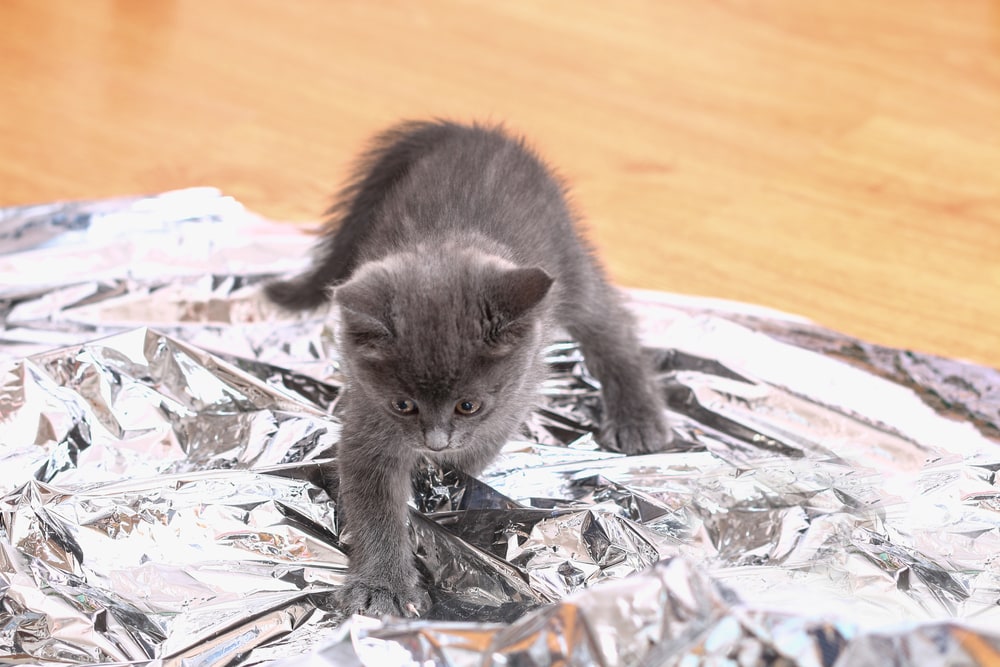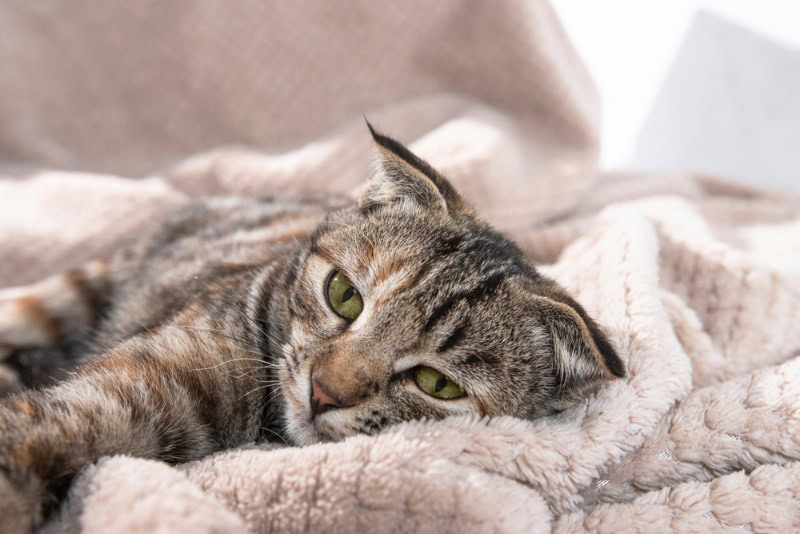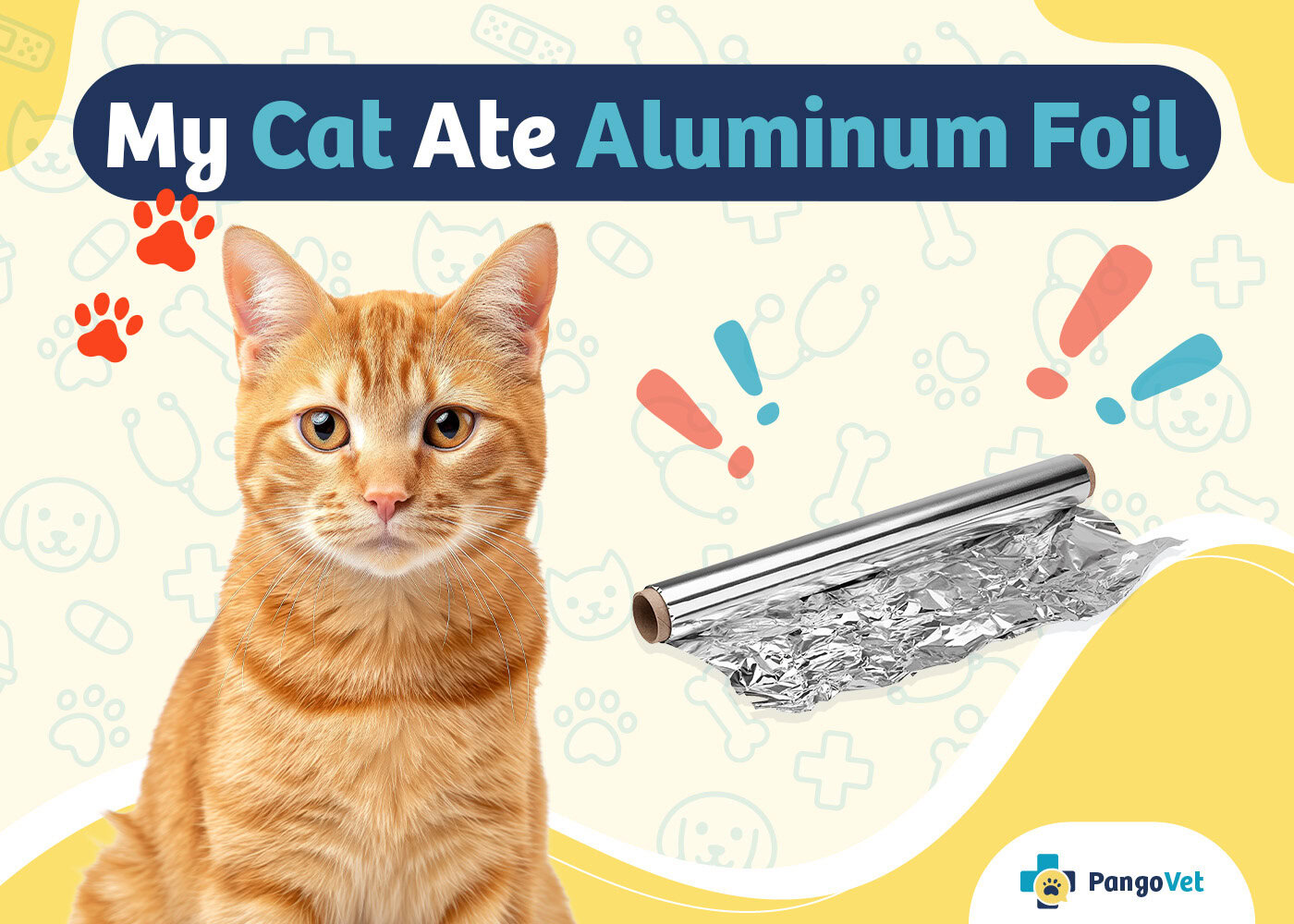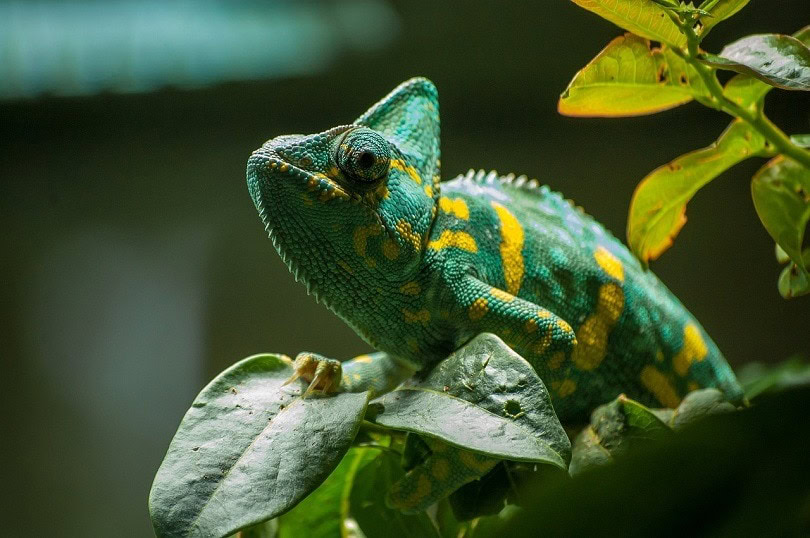VET APPROVED

The information is current and up-to-date in accordance with the latest veterinarian research.
Learn more »Click to Skip Ahead
It’s a well-known fact that cats are not fond of aluminum foil, but it is a sensory and textural issue, not because it’s toxic. Aluminum foil is a common household staple used for cooking, covering, and wrapping up leftovers. If you have made the mistake of leaving your foil-wrapped leftovers on the counter, your cat will likely push through their foil discomfort and rip into it anyway. What should you do if your cat has torn into your leftovers and ingested some aluminum foil?
If your cat ingests aluminum foil, you should seek veterinary attention immediately. A tiny amount of foil may not cause any harm and may require just monitoring. However, a significant amount can have fatal consequences. Only your vet can determine the severity of the problem. You are likely unsure how much your cat ingested, so it’s best to call the vet as soon as possible.

Your Cat Ate Aluminum Foil, Here’s What to Do!
Regardless of the amount of aluminum foil your cat ingested, you should always take your cat to the vet and follow their professional advice. If your cat has only swallowed a tiny amount of aluminum foil, your vet may recommend feeding them a high-fiber diet to help bulk their stools and help them pass it through the intestines with no complications. Your vet will likely ask you to monitor your kitty and watch for any signs of potential problems, such as lack of appetite, vomiting, drooling, lethargy, diarrhea, and constipation.
If your cat has eaten a large amount of aluminum foil, the situation is more dangerous. First, check your cat’s breathing. Aluminum foil can get lodged in the throat, so any signs of abnormal breathing should be addressed immediately. Once you’ve determined that your cat is breathing normally, check their mouth in case they got any injuries from chewing on the aluminum foil. Your vet will explain what to do next. The good news is that aluminum foil is normally visible on X-rays, and therefore, your vet will know where the foreign body is and if it is transitioning well.
It can take 24–72 hours for aluminum foil to pass through your cat’s stool. If your vet has asked you to monitor your cat at home, you will need to keep them inside, keeping them well-fed and hydrated. Feeding a high-fiber diet will speed intestinal transit up and will increase the volume of the stools making it less likely for the aluminum foil to cause any harm. Great high-fiber options are canned pumpkin, psyllium husk, brown bread, green beans, or plain bran flakes (with no added raisins, chocolate, or sweeteners—all of which are toxic to cats). If at any point while you are monitoring your cat they are acting strangely, you should see your vet immediately.

Is Aluminum Foil Dangerous for Cats?
Yes, ingested aluminum foil is a non-toxic foreign object that can be dangerous to your cat. If your cat has sniffed around your leftover food and given it a lick, you won’t need to be concerned. Aluminum foil cannot be digested and can obstruct the cat’s gastrointestinal tract, which can be fatal if not treated immediately. It is also possible that the foil could get stuck in your cat’s throat, causing a choking hazard.
Crumpled foil can have sharp edges, which can damage the lining of your cat’s stomach, intestines, and possibly the inside of their mouth.
Beware that certain foods that could be wrapped in aluminum foil in your kitchen could be highly toxic to cats.2 If your cat had access to human foods like garlic, onion, chocolate or raisins you should contact your vet straight away since all these food items can have severe consequences in your kitty.


Signs of Intestinal Blockage
As we mentioned before, the biggest danger is that your cat has ingested a large amount of aluminum foil that may cause an obstruction. Here are some signs that indicate your cat may have an intestinal blockage.
- Vomiting
- Retching
- Drooling
- Decreased appetite
- Diarrhea
- Abdominal pain
- Distended abdomen
- Straining to pass stool
- Lethargy
- Hiding
- Weight loss
If you observe any of these signs, get your cat to the vet immediately.
How to Keep Your Cat Safe from Aluminum Foil
Cats are known for not liking aluminum foil because of its crumpling sound, but its shiny reflection may be enticing. Of course, if a tasty smell comes from the foil, your cat will likely be curious.
- Store the foil in your cupboard when it’s not in use.
- Don’t leave food wrapped in foil on your counter.
- If you are defrosting food with a foil wrapping, leave it in the fridge.
- Crumple used foil into a ball before throwing it in the garbage.
- Always check for pieces of foil on your counter or floor when you have finished using it.

Conclusion
Aluminum foil is not usually something your cat would be interested in, but it suddenly becomes very enticing when it’s holding some delicious leftovers. If your cat just licks the foil, you shouldn’t have anything to worry about unless it contains any toxic foods such as chocolate or garlic.
If your cat has ingested any amount of aluminum foil you will need to take them to the vet immediately for evaluation. Depending on the amount ingested and the clinical signs, your veterinarian will develop a treatment plan for your cat. They may recommend you monitor your cat closely and feed them a special diet or have the aluminum foil removed by endoscopy or surgery. Now that you are aware of all the risks ensure that foil is out of your cat’s reach at all times, especially if something tasty is wrapped in it.
Featured Image Credit: Engin Akyurt, Pixabay













2 Responses
Well, it does sound like that is why my little blind kitten has gotten sick. Lost his appetite and now losing weight, lost most of his energy, vomited yesterday and it didn’t look like regular vomit. Just now figuring out why he started going the other way after a successful surgery. He was doing so good. It is 3 am and I have to wait until 8 to get into vet. This will be a heartbreaker if they can’t save him. I figure it has been about 4 days since he might have swallowed the foil. Laying up here at night trying to figure what could have happened and back tracked to him waking me up one night making a lot of noise and he was playing with tin foil. Must be the problem. It is my fault because I made a little litter box to put in his box and covered the bottom with foil. Big mistake! Going to be a long night.
Dear Richard,
thank you for your comment, although we are very sorry to hear about your struggles with your kitten. We sincerely hope that you were able to solve the situation successfully and your kitten is well. Taking your kitten to the vet is surely the best thing you can do here and also bear in mind that some veterinary clinics offer emergency services that are accessible 24/7, at the very least through the phone.
You can also reach out to one of our veterinarians at PangoVet.com. They will be happy to help you.
Best of luck to you and your kitten!